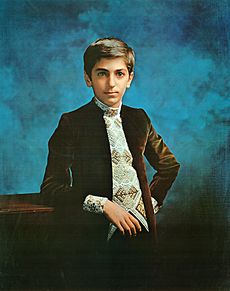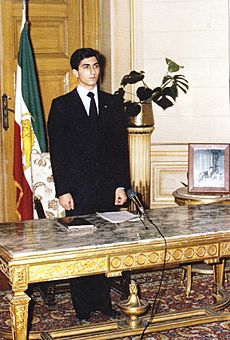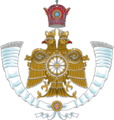Reza Pahlavi, Crown Prince of Iran facts for kids
Quick facts for kids Reza Pahlavi |
|
|---|---|
| Crown Prince of Iran | |
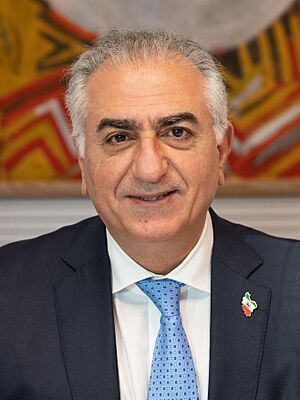
Pahlavi in 2023
|
|
| Leader of the Iranian Transitional Government (De facto) |
|
| Tenure | 18 February 2025 – present |
| Predecessor | Office established |
| Head of the House of Pahlavi | |
| Tenure | 31 October 1980 – present |
| Predecessor | Farah Diba (as regent in pretence) |
| Born | 31 October 1960 Tehran, Imperial State of Iran |
| Spouse |
Yasmine Etemad-Amini
(m. 1986) |
| Issue | Noor Pahlavi Iman Pahlavi Farah Pahlavi |
| House | Pahlavi |
| Father | Mohammad Reza Pahlavi |
| Mother | Farah Diba |
|
Party
|
National Council of Iran
(2013–2017) |
|
Alma mater
|
|
|
Website
|
|
| Religion | Shia Islam |
| Signature | |
| Styles of Reza Pahlavi |
|
|---|---|
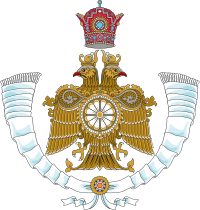 |
|
| Reference style | His Imperial Highness |
| Spoken style | Your Imperial Highness |
Reza Pahlavi (born 31 October 1960) is an Iranian opposition leader who supports liberal democracy in Iran. He has been the Leader of the Iranian Transitional Government since February 2025. He is part of the Pahlavi dynasty and is the oldest son of Farah Diba and Mohammad Reza Pahlavi, who was the last shah (king) of Iran.
Reza Pahlavi is seen as an important figure in the movement for democracy in Iran. He started and leads the National Council of Iran, a group of Iranian opposition members living outside Iran. He believes Iran should hold a free vote (referendum) to decide what kind of government it wants in the future. He became the official Crown Prince of Iran in 1967 when his father became king. He trained as a fighter pilot in the US. Pahlavi offered to help Iran during the Iran–Iraq War but the Iranian government did not accept his offer. He is a strong critic of Iran's current Islamic Republic government and has often called for protests to remove it.
Pahlavi has suggested that Iran should become a friend to countries in the West and Europe. News reports have mentioned that he is well-known both inside and outside Iran and has plans to improve the country. Some groups see him as a person who can bring different Iranian opposition groups together. In February 2025, various opposition groups chose Pahlavi to lead them and a future temporary government. This temporary government would be in place until Iran could form its first national assembly and start a democratic government through free elections.
Contents
Early Life and Education
Reza Pahlavi was born in Tehran. He is the oldest son of Mohammad Reza Pahlavi, who was the Shah of Iran, and Farah Pahlavi, the Shahbanu (Empress) of Iran. He has several siblings: Princess Farahnaz Pahlavi (born 1963), Prince Ali Reza Pahlavi (1966–2011), and Princess Leila Pahlavi (1970–2001). He also has a half-sister, Princess Shahnaz Pahlavi (born 1940).
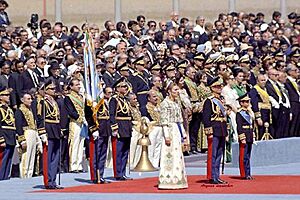
When he was born, the Shah pardoned 98 political prisoners, and the government lowered income tax by 20%. He went to a private school called "Reza Pahlavi School" inside the royal palace. Only the royal family and their close friends could attend. He learned to fly planes, making his first solo flight at age 11 and getting his pilot's license a year later. He was also a fan of the Taj Abadan football club.
In August 1978, as a student pilot for the Imperial Iranian Air Force, he went to the United States to continue his pilot training. He was one of 43 student pilots in a one-year program at a base in Texas. He learned to fly the Cessna T-37 Tweet and Northrop T-38 Talon. Because of the Iranian Revolution, he left the base in March 1979, earlier than planned.
Pahlavi started studying at Williams College in September 1979 but left in 1980. He then enrolled at The American University in Cairo to study political science, but he did not attend regularly. In 1981, he reportedly left that program too and continued his studies privately with Iranian professors. He focused on Persian culture and history, Islamic philosophy, and oil in Iran.
After the Islamic revolution and the start of the Iraq-Iran war in 1980, Pahlavi offered to serve as a fighter pilot for Iran. His offer was not accepted.
He earned a BSc degree in political science through correspondence from the University of Southern California in 1985. He speaks English and French fluently, in addition to his native Persian.
Political Activities in Exile
Reza Pahlavi moved to Cairo, Egypt, with his family in March 1980. When his father, Mohammad Reza Pahlavi, was very ill, some people who supported the monarchy suggested that Reza should not be the next king. They thought his younger brother, Ali Reza, should take his place with a group of advisors. However, the Shah reportedly refused this idea. After his father passed away on July 27, 1980, Farah Pahlavi declared herself as a temporary ruler. On his 20th birthday, October 31, Reza Pahlavi announced himself as the new king of Iran, Reza Shah II, and the rightful heir to the Pahlavi dynasty. The United States government quickly stated that they did not support him and recognized the Iranian government.
In 1981, Pahlavi stayed in the Koubbeh Palace and built connections with groups that wanted the monarchy back. He faced rejection from other opposition groups. In March, he released a statement for the Persian New Year, asking all opponents of the Iranian government to unite and start a "national resistance." In August, Pahlavi announced that he had been secretly planning to overthrow the Iranian government.
In 1986, Pahlavi announced that he had formed a government-in-exile. This government's goal was to bring back a constitutional monarchy in Iran.
On his website, Pahlavi has stated that Iran should become a democratic and secular country, where human rights are respected. He believes the Iranian people should decide whether their future government is a constitutional monarchy or a republic.
Pahlavi has used his position to speak out for human rights, democracy, and unity among Iranians both inside and outside Iran. He calls for a clear separation of religion and state in Iran. He also wants free and fair elections for all people and political ideas. He encourages all groups who want democracy to work together for a democratic and secular Iranian government.
In February 2011, when protests started in Tehran, Pahlavi said that young people in Iran were determined to get rid of the government. He believed they wanted to create a democracy. He told The Daily Telegraph that change was needed in the region and that young people were ready for it.
In June 2018, he said, "I believe Iran must be a secular, parliamentary democracy. The final form has to be decided by the people." In December 2018, he asked for non-military support for those in Iran trying to replace the current government with a secular democracy. He sees himself more as a symbol than a politician, but he has said he is "ready to serve my country."
During anti-government protests in Iran in 2022, Pahlavi predicted that the Islamic government would soon collapse. He pointed to events like the shooting down of a passenger plane, bans on foreign vaccines, and rising food prices. He urged members of the Iranian armed forces who oppose the government to peacefully resist. He also called for a united front against the government. While acknowledging support from protesters who wanted the monarchy back, he stated, "I don't tell them what to do. I'm not a political leader."
In February 2023, Pahlavi asked the British and European governments to declare the Islamic Revolutionary Guard Corps (IRGC) a terrorist group. He believed this would weaken the Iranian government. He also thought the Islamic Republic was more likely to fall than in previous decades. He said many Iranian activists wanted him to play a central role in forming a new government. However, he repeated that he would let the people of Iran decide whether to bring back the monarchy. He also said he would not run for political office if the government fell.
In March 2023, Pahlavi visited the United Kingdom and spoke at the Oxford Union. He argued that being "secular" (not based on religion) is necessary for democracy. He called for Internet access to be restored in Iran to help communication among protest movements. He also urged using non-violent methods to bring down the Iranian government.
On April 17, 2023, he and his wife Yasmine visited Israel. This visit was an effort to improve the historic relations between Iran and Israel. He visited important sites and met with Israeli leaders.
In 2023, the Atlantic Council suggested Pahlavi could be a unifying figure for the Iranian opposition. In 2024, Worldcrunch also identified him as a key figure for Iranian democracy. They believed he represents the continuation of Iranian history, offering a different path for Iran's future compared to the current government.
Support and Succession
Reza Pahlavi II is the first in line to succeed his late father. His younger brother, Ali-Reza Pahlavi II, was second in line until his death in 2011.
In February 2019, Reza Pahlavi started the Phoenix Project of Iran. This project aims to bring different opposition groups closer to a shared vision for Iran after the current religious government.
Support Within Iran
A report in 2009 suggested that Pahlavi did not have a large organized following inside Iran. However, during the 2017–18 Iranian protests, some videos on social media showed protesters chanting slogans in favor of Pahlavi's grandfather and calling for his return.
In January 2023, an Iranian scholar noted that support for Pahlavi has become more visible among younger Iranians on social media and at protests. He said that Pahlavi has some support in Iranian society, though it is hard to know exactly how much. Several Iranian activists and celebrities have also supported Pahlavi as a figure to unite anti-government movements. One intellectual in Tehran believed that if a vote were held today, Pahlavi would likely win easily because people do not know many other leaders.
A 2023 article found support for Pahlavi within Iran, with people using slogans like "Pahlavi is our choice, the leader of our revolution" and "Pahlavi, you are our representative." A 2024 poll by an American research group found that almost 80% of Iranians prefer Pahlavi over the current government. In 2025, an expert from the Foundation for the Defense of Democracies said Pahlavi is the only Iranian opposition leader with enough recognition and support to lead a replacement for the current government.
Support Among Iranians Abroad
Pahlavi is very popular with older Iranians living outside Iran who left during the 1979 revolution. He also has some support from people inside Iran. In 2006, it was noted that Los Angeles, home to many Iranian expatriates, was a strong area of support for the monarchy.
A 2013 survey of Iranian-Americans found that most did not support any specific opposition groups. However, among those who did, 20% supported Pahlavi.
Support During Recent Protests
In 2023, a petition was created to gather support for Reza Pahlavi as a leader for change. It received over 460,000 signatures.
Reza Pahlavi asked Iranians worldwide to protest against the Islamic Republic on its 44th anniversary, February 11, 2023. As a result, many people rallied in cities across the US, Europe, Australia, and Canada. Reza Pahlavi himself joined a rally in Los Angeles, where more than 80,000 people attended.
July 2024 Speech
In July 2024, Pahlavi spoke at a conference in Washington, D.C. He blamed the Iranian government for spreading radical Islam to other nations after the revolution. He promised that Iranians would soon take their country back. He also warned the United States not to start a military campaign against the government, saying "the problem that began in Iran must be ended in Iran." He concluded that a free Iran would seek partnership and friendship, not patronage or funding.
In an essay, he called for the IRGC to be labeled a terrorist group by the British government. He cited their funding of groups like Hezbollah and Hamas, and their actions against the Zan Zendegi Azadi (Woman, Life, Freedom) movement.
2024–2025 Developments
In November 2024, Pahlavi called on Iranians to "reclaim and save our beloved Iran." He offered to "guide this change and lead the transitional period." However, he did not directly explain how the current government might be removed.
In January and February 2025, he advised U.S. President Donald Trump not to make a deal with the Islamic Republic. This deal would have limited Iran's nuclear program in exchange for lifting sanctions.
During the 2025 Iran–Israel war, after Iran blocked the internet, Pahlavi said the blackout was "a sign of panic not strength." He also said that the destruction of Iran's military bases and fighter jets was a loss. Pahlavi stated that the war was not the Iranian people's war but Khamenei's war, and that Iranians were paying the price.
A sociology expert from Yale University, described as a supporter of Pahlavi, said he is "a very strong leader who is very trusted, very popular, and who has principles that are deeply respected by the Iranian people." An expert from the Foundation for Defense of Democracies said Pahlavi has been consistent in calling for freedom for Iranians. He has also been open to whatever form of government Iranians choose, whether a constitutional monarchy or a republic.
Munich Conference
In February 2025, the Munich Security Conference invited Reza Pahlavi to attend. However, due to pressure from the Islamic Republic, the invitation was first withdrawn, then re-invited, and then cancelled again. Reza Pahlavi criticized this decision, calling it "a betrayal of the Iranian people and the democratic values of Germany." He stated that the German government had "silenced the voice of the Iranian people" and "aligned itself with the Islamic Republic."
At a "Munich Convergence Summit" on February 18, with various Iranian opposition groups, Reza Pahlavi stated, "Our goal today is solely the salvation of Iran, and in the future our mission is to hold free elections in Iran." He added that "the collapse within the regime has begun and must be broadened." He stressed that the goal should be to "establish a mechanism for cooperation" among different groups, rather than creating more opposition organizations. He further explained that their future duty is to create a democratic path based on the people's vote. This path would allow all possible options for Iran's new system to be discussed openly. A plan for a Constituent Assembly would soon be presented to the people, outlining how a national vote would be held for a democratic and secular future.
At the Convergence Summit, it was agreed that Prince Reza Pahlavi should take on the role of "the leader of the national revolution and transitional period." This role would last until the first parliament is elected and a democratic government is established through free elections. The statement declared, "Based on the will of the Iranian nation... we consider Prince Reza Pahlavi to be the leader... and we will support him with all our might."
At the same time, a group of Iranians protested outside the Munich Security Conference. They were protesting against the European Union's friendly policies toward the Islamic Republic, especially those of the German government.
Strategies for Change
At the Geneva Human Rights Meeting on February 20, Prince Reza Pahlavi shared five main strategies to bring about change in Iran:
- Organizing local groups within the country.
- Uniting Iranians living outside Iran.
- Asking the G20 governments to strongly support the Iranian people.
- Creating divisions within the government's structure to encourage people to leave it.
- Preparing for political stability and holding democratic elections.
Other Issues Addressed
- Role of women: He mentioned that one of the first actions of Ruhollah Khomeini was to cancel the Family Protection Law. He stated, "Iranian women are not merely fighting against the compulsory hijab in Iran. Their struggle is not for a mere piece of cloth, but for reclaiming equality and their country." He also praised brave women who continue to resist despite being imprisoned.
- Environmental destruction: He noted that under the Islamic Republic, places like Lake Urmia and rivers such as the Zayandeh have dried up. He said air pollution in cities like Tehran and Ahvaz is among the worst in the world. He called these actions a crime against both the environment and the people of Iran.
- Economic and social crises: He pointed out that in a country that should be very wealthy, many Iranians cannot afford basic food.
- Energy: He mentioned that Iran, which has the world's second-largest gas reserves, experiences widespread power outages. This causes problems for hospitals, businesses, and families.
- During the 2025 Iran–Israel war, as the Israeli government discussed changing the government in Iran, Pahlavi was often mentioned as a possible successor to Ayatollah Ali Khamenei.
Interview to The Daily Telegraph
On February 23, 2025, in an interview with The Daily Telegraph, Pahlavi called on Europe and Americans to prepare for the coming collapse of the government in Tehran. In this interview, The Telegraph noted that "even critics acknowledge Pahlavi at least has a plan for reform, and a rare degree of public recognition both inside and outside Iran."
Iran-Israel War
On June 17, 2025, during the Israel-Iran war, Pahlavi stated that the Islamic Republic of Iran was "on the verge of collapse." He said that disagreements and people leaving the government showed its coming downfall. Pahlavi expressed confidence that the Iranian people, who have resisted oppression for a long time, would soon be free. He also confirmed that plans were in place to help Iran become a democratic system once the current government falls. Pahlavi spoke to the Iranian military and security forces, urging them to leave the government and join the people's movement for change.
Political Views
According to ABC news, Reza Pahlavi believes Iran should become a secular, democratic, and liberal country.
Pahlavi has said he does not intend to be a long-term leader in Iran after a future temporary period. He believes the Iranian people should choose their form of government, whether a constitutional monarchy or a republic. Pahlavi supports a free vote in Iran where the people can decide. He has stated that after the Islamic revolution in 1979, he realized that separating religion from the state is a key principle for a democratic system. Pahlavi told the BBC that he personally prefers Iran to become a republic because he sees it as more fair. A poll of 158,000 Iranians found that 80% want to replace the Islamic Republic with a democratic government. The poll also found Reza Pahlavi to be the top choice to form a temporary leadership council, with 32% to 40% support among 34 candidates.
Pahlavi has called for more tolerance within Iran. He suggests creating independent groups to watch over the government and strengthening civil society to prevent too much power from being held by one group. Pahlavi is seen as a leading figure for the democracy movement in Iran. He supports a democratic vision for Iran, calling for free elections to establish a constituent assembly. He has "refused to commit to the restoration of the monarchy." Pahlavi told European members of parliament that Iran, after the current government, would be an ally of Europe and the West. He believes Iranian democracy must be secular and based on human rights. Also, Pahlavi believes in keeping Iran's borders and land whole.
According to ABC news, Pahlavi said, "The role that I'm offering in this process of transition is to be of help to maintain a smooth process — to maximise the participation of democratic forces in this process," regarding his future role.
Reza Pahlavi and the Iranian opposition have asked democratic countries to support their efforts to remove the Islamic government and establish a secular democracy in Iran. Pahlavi says that he and the opposition represent the Iranian democracy movement. Its activists are jailed, tortured, and some are even executed by the Islamic government in Iran. Pahlavi is in contact with people who oppose the government inside Iran.
According to an Iranian activist and journalist, Pahlavi "has been consistent in his messaging." She believes Pahlavi should be part of a larger group working together. The Foundation for Defense of Democracies has said that one representative could help make the Iranian message stronger.
Regarding the possibility of chaos if the Islamic government collapses, Pahlavi said that Iran is an ancient civilization, unlike other countries that had chaotic transitions. He stated, "We are not Iraq or Afghanistan. We are a nation with millennia of unity. If there’s rule of law and justice, there will be no anarchy." Pahlavi also said there would be no civil war.
Reza Pahlavi promised in a June 2025 interview that he would ensure "a lawful transition." He stated that experts in transitional justice would ensure fair trials, promising every defendant the right to defend themselves in court. Pahlavi said that unlike the 1979 revolution, no summary executions would be carried out. He also promised "equal rights for all Iranians—regardless of religion, ethnicity, or belief."
Personal Life
Family and Marriage
Pahlavi started a relationship with Yasmine Etemad-Amini in 1985. They married on June 12, 1986, in Greenwich, Connecticut. He was 25 and she was 17. They have three daughters: Noor (born April 3, 1992), Iman (born September 12, 1993), and Farah (born January 17, 2004).
In 2004, Pahlavi was named the "unofficial godfather" of Princess Louise of Belgium, who is the eighth granddaughter of King Albert II of the Belgians.
Hobbies
Pahlavi was a big fan of football and enjoyed playing and watching it. He supported the capital's football club Esteghlal, which was then called Taj (meaning Crown). His support was even shown on television.
Religious Beliefs
When asked about religion, Pahlavi said, "That's a private matter, but if you must know, I am, of course, by education and conviction, a Shia Muslim. I am very much a man of faith." An Iranian writer also noted that Crown Prince Reza is said to be "deeply attached" to his Muslim faith. He has made the Hajj (pilgrimage) to Mecca.
On April 6, 2024, Prince Reza Pahlavi and Princess Yasmine Pahlavi visited the Bhandara Atash Kadeh Zoroastrian temple in Houston, Texas. They took part in a Yasna ceremony. During his visit, Reza Pahlavi stated that Zoroastrianism is closely connected to Iranian history and civilization. He said he visited the temple to honor this ancient Iranian faith and show support for Zoroastrian compatriots and the Parsi community. He believes Zoroastrianism has played a critical role in Iran's development and that its influence will continue to grow.
Honours
National
 Sovereign and Grand Collar of the Order of Pahlavi (26 September 1967, Iran)
Sovereign and Grand Collar of the Order of Pahlavi (26 September 1967, Iran) Mohammad Rezā Shāh Pahlavi Coronation Medal (26 October 1967, Iran)
Mohammad Rezā Shāh Pahlavi Coronation Medal (26 October 1967, Iran) 25th Centennial Anniversary Medal (14 October 1971, Iran)
25th Centennial Anniversary Medal (14 October 1971, Iran) Persepolis Medal (15 October 1971, Iran)
Persepolis Medal (15 October 1971, Iran)
Foreign
 Knight of the Royal Order of the Seraphim (24 November 1970, Sweden)
Knight of the Royal Order of the Seraphim (24 November 1970, Sweden) Knight Grand Cross of the Order of Merit of the Italian Republic (15 December 1974, Italy)
Knight Grand Cross of the Order of Merit of the Italian Republic (15 December 1974, Italy) Knight of the Collar of the Order of Isabella the Catholic (19 April 1975, Spain)
Knight of the Collar of the Order of Isabella the Catholic (19 April 1975, Spain) Grand Cross of the Legion of Honour (14 December 1976, France)
Grand Cross of the Legion of Honour (14 December 1976, France) Grand Star of the Decoration of Honour for Services to the Republic of Austria (1976, Austria)
Grand Star of the Decoration of Honour for Services to the Republic of Austria (1976, Austria) Grand Collar of the Royal Order of the Drum (Rwanda)
Grand Collar of the Royal Order of the Drum (Rwanda) Knight of the Supreme Order of the Most Holy Annunciation (26 April 2023, House of Savoy)
Knight of the Supreme Order of the Most Holy Annunciation (26 April 2023, House of Savoy)
Other Recognitions
- Radio Farda's Person of The Year online poll (2011)
- Key to the City of Beverly Hills (23 January 2017, Los Angeles, California)
Images for kids
See also
 In Spanish: Reza Pahlaví (II) para niños
In Spanish: Reza Pahlaví (II) para niños
 | Jewel Prestage |
 | Ella Baker |
 | Fannie Lou Hamer |


